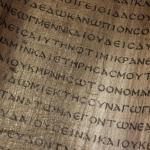*
His words will be in blue. Translations from the Portugese of his book will be made with Google Translate (with an occasional additional modification). I will use RSV for Bible translations.
There are numerous problems with auricular confession, as the scriptures are clear in saying that we must confess, seeking forgiveness from our sins, only to God. (p. 71)
Really? That’s news to me:
Leviticus 5:5-6 When a man is guilty in any of these, he shall confess the sin he has committed, [6] and he shall bring his guilt offering to the LORD for the sin which he has committed, a female from the flock, a lamb or a goat, for a sin offering; and the priest shall make atonement for him for his sin. (cf. Num 5:6-7)
Mark 1:4-5 John the baptizer appeared in the wilderness, preaching a baptism of repentance for the forgiveness of sins. [5] And there went out to him all the country of Judea, and all the people of Jerusalem; and they were baptized by him in the river Jordan, confessing their sins. (cf. Mt 3:6)
John 20:23 If you forgive the sins of any, they are forgiven; if you retain the sins of any, they are retained. [implied prior confession]
Acts 19:18-19 Many also of those who were now believers came, confessing and divulging their practices. [19] And a number of those who practiced magic arts brought their books together and burned them in the sight of all; . . .
James 5:16 Therefore confess your sins to one another, and pray for one another, that you may be healed. . . .
The Bible also has many passages in which men confess to God, which is fine. Catholics do not oppose that at all (we are encouraged to do so), and it doesn’t contradict the above (since nothing in the inspired, inerrant Bible is self-contradictory). All we require is confession to a priest in the case of mortal (very serious) sins.
Juan made a response to James 5:16 above: “The text clearly says to ‘confess to one another’ and not to a specific priest.” (p. 72)
It depends on what “one another” means. It can (and may here) mean “confess to men rather than only to God“. If so, priests are men just like other men. So this would be consistent with that understanding. Secondly, the context is highly suggestive of confession to the “elders” of the Church. and forgiveness of sins are specifically mentioned:
James 5:14-15 Is any among you sick? Let him call for the elders of the church, and let them pray over him, anointing him with oil in the name of the Lord; [15] and the prayer of faith will save the sick man, and the Lord will raise him up; and if he has committed sins, he will be forgiven.
Right after 5:15 refers to sins being forgiven, the next verse (and the original NT didn’t have verses) states, “Therefore confess your sins to one another . . .” And where 5:16 says, “pray for one another” in order to be “healed,” the context of 5:14-15 describes elders praying over someone and sick men being “save[d]” and “forgiven.” So the context is strongly suggestive of confession to clergymen in the Church, and certainly doesn’t contradict the Catholic practice.
However, the act of confessing in the text refers to spiritual help that each one can provide to his neighbor, aiming to help them to overcome sin, not that the confessional gives power to the brothers to forgive sins committed against God. (p. 72)
This overlooks the context as well. The second part of James 5:16 and the following two verses state:
James 5:16b-18 . . . The prayer of a righteous man has great power in its effects. [17] Eli’jah was a man of like nature with ourselves and he prayed fervently that it might not rain, and for three years and six months it did not rain on the earth. [18] Then he prayed again and the heaven gave rain, and the earth brought forth its fruit.
Just as people in Old Testament times asked the great prophet Elijah to pray for them (according to the frequently stated biblical principle of seeking out holy persons to intercede), so James is urging Christians to go to their elders in the Church, who will pray for them, anoint them, and offer forgiveness and absolution for their sins. And they have more power, which is the whole point of drawing the analogy to Elijah and his great power of prayer, since he was righteous. It’s all quintessentially sacramental and transactional (one man or woman to a man who represents God); thoroughly Catholic.
Juan brings up 2 Corinthians 2:10-11 and states: “He did not say: ‘if the priest forgave, I also forgive’, but rather: ‘If you forgave me, I forgive you too.’ There is a huge difference between the first thing and the other.” (p. 72)
Juan neglects the background of this incident, and the implications for our present topic. I was going to bring this passage up myself, as I wrote about it in my first book, A Biblical Defense of Catholicism (pp. 163-164):
1 Corinthians 5:3-5: “I have already pronounced judgment in the name of the Lord Jesus on the man who has done such a thing. When you are assembled, and my spirit is present, with the power of our Lord Jesus, you are to deliver this man to Satan for the destruction of the flesh, that his spirit may be saved in the day of the Lord Jesus” (see 1 Cor. 5:1-2)
2 Corinthians 2:6-8, 10-11: For such a one this punishment by the majority is enough; so you should rather turn to forgive and comfort him, or he may be overwhelmed by excessive sorrow. So I beg you to reaffirm your love for him . . . Any one whom you forgive, I also forgive . . . in the presence of Christ, to keep Satan from gaining the advantage over us; for we are not ignorant of his designs.
St. Paul in his commands and exhortations to the Corinthians is in entire agreement with the Catholic tenets of penance and indulgences. He binds in 1 Corinthians 5:3-5 and looses in 2 Corinthians 2:6-7, 10, acting as a type of papal figure in 2 Corinthians 2:10, much like St. Peter among the Apostles. He forgives, and bids the Corinthian elders to forgive also, even though the offense was not committed against them personally. Clearly, both parties are acting as God’s representatives in the matter of the forgiveness of sins and the remission of sin’s temporal penalties (an indulgence).
Paul was the one authoritatively acting as a priest, and imposing penance (1 Cor 5:3-5): “you are to deliver this man to Satan . . .” When the man repented Paul urged the congregants to accept him back into normal relations (extending absolution). St. Paul had done the same with regard to Hymenaeus and Alexander the Coppersmith (1 Tim 1:20). He urges the Corinthians to forgive him, too (Jesus’ command of “seventy times seven”). But he forgives the man in the sense of formal absolution, as an authority in the Church. He was exercising the powers of binding and loosing:
Matthew 16:19 I will give you the keys of the kingdom of heaven, and whatever you bind on earth shall be bound in heaven, and whatever you loose on earth shall be loosed in heaven.
Matthew 18:18 . . . Whatever you bind on earth shall be bound in heaven, and whatever you loose on earth shall be loosed in heaven.
John 20:23 If you forgive the sins of any, they are forgiven; if you retain the sins of any, they are retained
This was for the clergy only, which is why Jesus said this — and granted the sacramental power and prerogative — only to His disciples, not to the public at large.
Jesus never asked anyone for indulgences when he forgave sins. What he always said was: “go, and sin no more” (John 8:11), and not: “go, pray 25 Hail Marys and the rosary, and then you will be forgiven!” (p. 72)
This is wrongheaded and stupefied on many levels. First of all, what Juan describes is not an indulgence (a relaxation of penance) but rather, penance itself.
Secondly, the forgiveness is not conditional upon the penance. The priest has already pronounced absolution and forgiveness in the confessional. Penance is to remove the temporal punishment for sin and bring home the point that sin costs something.
Thirdly, such penance is seen in the Bible. I wrote about this in my first book, too:
Numbers 14:19-23: “Pardon the iniquity of this people, I pray thee, according to the greatness of thy steadfast love, and according as thou hast forgiven this people, from Egypt even until now.” Then the Lord said, “I have pardoned, according to your word; but truly, as I live, and as all the earth shall be filled with the glory of the Lord, none of the men who have seen my glory and my signs which I wrought in Egypt and in the wilderness, and yet have put me to the proof these ten times and have not hearkened to my voice, shall see the land which I swore to give to their fathers; and none of those who despised me shall see it.”
God forgave the Israelites (14:20), due, at least in part to Moses’ intercession (14:19). Yet, punishment, or penance, remained (14:23) because of their exceedingly great disobedience despite signs and wonders (14:22). Thus, forgiveness is not complete in the sense that it removes all the ramifications of sin, or “cancels out” any further need for satisfaction and penitential acts either undertaken voluntarily, ordered by legitimate Church authority, or ordained by God Himself by means of trials and tribulations. (p. 156)
Fourthly, Jesus more than once told people to do something after He healed them (which is highly akin to the mild penances that priests impose):
Matthew 8:3-4 And he stretched out his hand and touched him, saying, “I will; be clean.” And immediately his leprosy was cleansed. [4] And Jesus said to him, “See that you say nothing to any one; but go, show yourself to the priest, and offer the gift that Moses commanded, for a proof to the people.” (cf. Mk 1:44; Lk 5:14)
Matthew 9:29-30 Then he touched their eyes, saying, “According to your faith be it done to you.” [30] And their eyes were opened. And Jesus sternly charged them, “See that no one knows it.” [it’s very difficult to not report such a thing!]
Mark 7:35-36 And his ears were opened, his tongue was released, and he spoke plainly. [36] And he charged them to tell no one; . . .
Luke 8:54-56 But taking her by the hand he called, saying, “Child, arise.” [55] And her spirit returned, and she got up at once; and he directed that something should be given her to eat. [56] And her parents were amazed; but he charged them to tell no one what had happened.
Luke 17:11-14 On the way to Jerusalem he was passing along between Sama’ria and Galilee. [12] And as he entered a village, he was met by ten lepers, who stood at a distance [13] and lifted up their voices and said, “Jesus, Master, have mercy on us.” [14] When he saw them he said to them, “Go and show yourselves to the priests.” And as they went they were cleansed.
John 9:7 saying to him, “Go, wash in the pool of Silo’am” (which means Sent). So he went and washed and came back seeing.
And when Jesus said, “go and sin no more” to the woman caught in adultery (which Juan brought up), I would ask him, as Jesus was in the habit of doing (being the socratic): “which of these two things is more difficult?: to never sin again in one’s entire life, or to spend 30 minutes saying the Rosary?” Hence, what Jesus said in that instance, which Juan takes as a disproof of penance, is actually extremely difficult if not impossible penance, and helps prove the Catholic case. All the biblical commands telling us not to sin (which apply whether one accepts the myth of extrinsic justification or not) are all infinitely harder to follow than saying a Rosary. Yet Juan wants to squabble about that miniscule penance? See:
Romans 6:11-13 So you also must consider yourselves dead tosin and alive to God in Christ Jesus. [12] Let not sin therefore reign in your mortal bodies, to make you obey their passions. [13] Do not yield your members to sin as instruments of wickedness, but yield yourselves to God as men who have been brought from death to life, and your members to God as instruments of righteousness.
1 Corinthians 15:34 Come to your right mind, and sin no more.
2 Corinthians 7:1 . . . let us cleanse ourselves from every defilement of body and spirit, and make holiness perfect in the fear of God.
Ephesians 4:26 Be angry but do not sin . . .
1 Timothy 5:20, 22 As for those who persist in sin, rebuke them in the presence of all, so that the rest may stand in fear. . . . [22] . . . keep yourself pure.
Hebrews 10:26 For if we sin deliberately after receiving the knowledge of the truth, there no longer remains a sacrifice for sins,
Hebrews 12:1 . . . let us also lay aside every weight, and sin . . .
1 Peter 1:16 since it is written, “You shall be holy, for I am holy.”
1 John 2:1 My little children, I am writing this to you so that you may not sin . . .
1 John 3:6, 8-9 No one who abides in himsins; no one who sins has either seen him or known him. . . . [8] He who commits sin is of the devil; . . . [9] No one born of God commits sin; for God’s nature abides in him, and he cannot sin because he is born of God.
1 John 5:18 We know that any one born of God does not sin
Likewise, when Jesus told the rich young ruler to sell all he had in order to gain salvation, it was a work (of penance, if you will) that was necessary to receive complete forgiveness and salvation.
Here’s another passage in which a penance is imposed in conjunction with forgiveness extended:
Numbers 5:6-7 “Say to the people of Israel, When a man or woman commits any of the sins that men commit by breaking faith with the LORD, and that person is guilty, [7] he shall confess his sin which he has committed; and he shall make full restitution for his wrong, adding a fifth to it, and giving it to him to whom he did the wrong.
This is the principle of restitution (cf. Ex 22:1, 5-6, 11-15; Lev 5:16): returning what one stole or offering a commensurate recompense. It’s not enough to simply be declared forgiven. And penance in Catholicism reflects this very biblical understanding.
Referencing Mark 5:34, Juan wrote, “Now, what ‘saved’ the woman was not the payment of penance after the confession, but rather her faith.” (p. 72)
Once again, Juan is out to sea as to the actual nature of Catholic absolution. To repeat, we don’t believe that imposed penances (usually now very minor) are what forgives a person. The priest has already absolved them of their sin in the confessional. Here is the current formula that Catholic priests say in order to absolve a penitent:
God, the Father of mercies, through the death and resurrection of his son has reconciled the world to himself and poured out the Holy Spirit for the forgiveness of sins; through the ministry of the church may God grant you pardon and peace, and I absolve you from your sins in the name of the Father, and of the Son, and of the Holy Spirit.
Are we supposed to be impressed that Juan more or less continually misrepresents or never understands in the first place, so many Catholic beliefs and practices?
The only sin that a Christian brother has the power to forgive are sins committed against his person. (p. 73)
That’s clearly untrue. Paul, in the example I provided above of the sinning Corinthian man, wasn’t personally sinned against. But he imposed penance on him and then forgave him in the sense of absolution. John 20:23 states: “If you forgive the sins of any, they are forgiven; if you retain the sins of any, they are retained.” I guess if Juan had written the Gospel of John instead of St. John, this verse would have read, “If you forgive the sins of any who sin against you, they are forgiven; if you retain the sins of any who sin against you, they are retained.”
John the Baptist offered forgiveness of sins through his baptism. They weren’t sins against him! Leviticus 4:35 states: “the priest shall make atonement for him for the sin which he has committed, and he shall be forgiven.” “Pardon the iniquity of this people, I pray thee” (Moses: Num 14:19; and God complies in 14:20). If Juan would simply read the entire Bible, or adequately study and research every claim he makes about it, things would go much better for him, and his readers would be far better educated.
*
*
Summary: Juan Oliveira misrepresents the Catholic Church’s view of sacramental confession and absolution in several ways. I correct him with massive biblical arguments.














